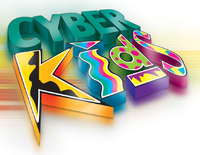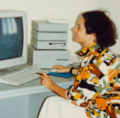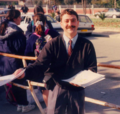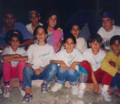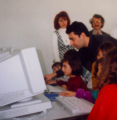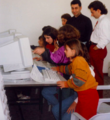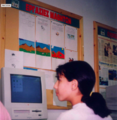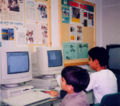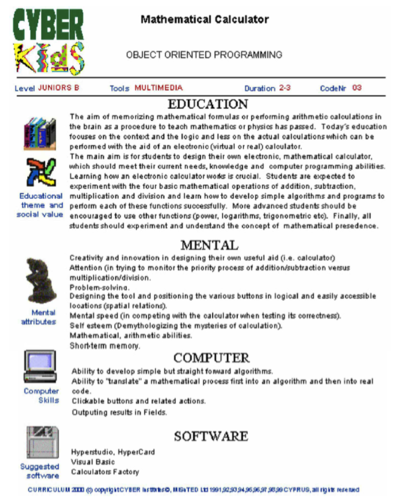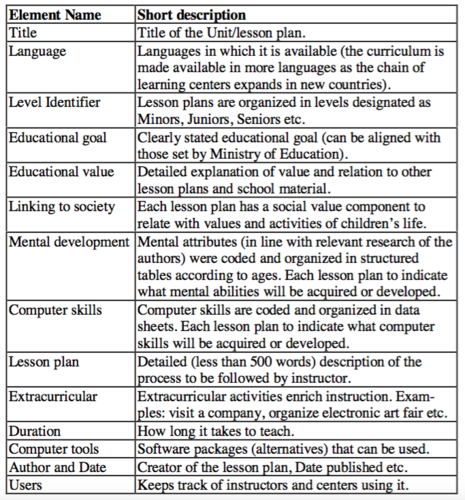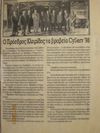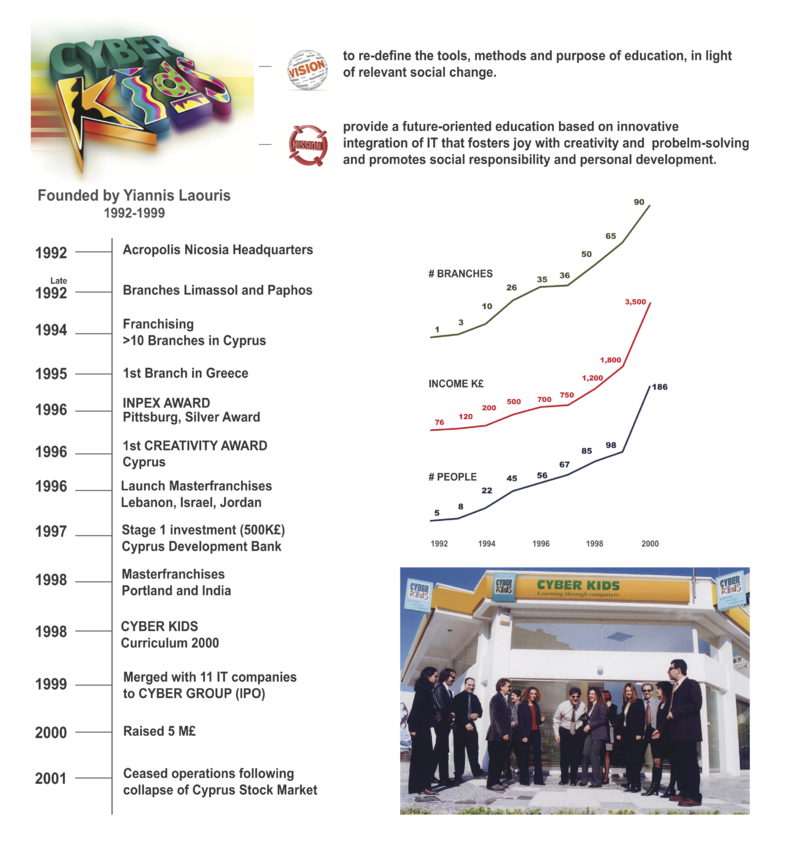CYBER KIDS
|
CYBER KIDS was a nation-wide social entrepreneurial experiment launched in 1992 in Cyprus by Yiannis Laouris, George Vakanas and Maria Symeonides. The Research and Development of its award winning curriculum was done by the Cyprus Neuroscience and Technology Institute. Within the first five years (1992-1997) 26 computer- learning centers were launched with average of 50-150 students enrolled every year in each location. By 1999, the number of children who benefited from the Cyber Kids curriculum in the 36 Branches exceeded 15,000, which is approximately equal to 20% of the country’s youth population (ages 6-15). CYBER KIDS has also contributed against brain drain by employing a total of 186 young scientists between 1991-1999. More importantly, MISnTED Ltd., the owner company had a policy of employing teachers from the public educational system as part-timers as a means of contributing to a large-scale reform from within the system.
The Founders
Even though not a shareholder, Stelios Stylianou who has supported the launching of the project in its first two years, and Dinos Georgiades, who later joined as a shareholder, are also considered Founders.
The "profitable dream" concept
CYBER KIDS was based on a concept coined by its creators, then called the "profitable dream". They envisioned that
- Introducing advanced computer technology in the lives of a critical number of young children using an educationally relevant and socially responsible, peace-enhancing curriculum would allow them to promote creativity, innovation, imagination, and problem solving abilities, thus “transcending” the country’s educational and political life and move the new generation a decade ahead.
The project was founded on a well-defined vision statement:
- ... to re-define the tools, methods and purpose of education, in light of relevant social change.
The vehicle chosen to disseminate the impact of the project and its vision was the profit-making concept of franchising, thus creating new business both in Cyprus and in the seven countries in which it expanded, thus spreading the Cyber Kids philosophy and knowledge to many more spheres of social life.:
- Lebanon (1994)
- Israel (1995)
- Greece (1996)
- Jordan
- Egypt (1997)
- USA (Oregon: 1998)
- India (2000)
Company evolution and death
CYBER KIDS was an internationally registered trademark of the mother company, MISnTED: Management Information Systems & Technology Development. The three founding members, Yiannis Laouris, George Vakanas and Maria Symeonides donated 30% of their total shares to the Cyprus Neuroscience and Technology Institute in order to fund its socially responsible research operations. In addition, MISnTED: Management Information Systems & Technology Development provided yearly grants to Cyprus Neuroscience and Technology Institute for research. The project was originally funded by the partners' and by a CY £44,000 government loan. All key people were invited to join as partners: Dinos Georgiades, Evros Alexandrou, Harry Anastasiou, and all employees were given shares totalling to £250,000 of value. In 1996, the Cyprus Development Bank became a partner with 10% in the Cyprus (mother) company and 30% in the Greek subsidiary, investing £100,000 and £300,000 respectively. It was under the leadership of the Cyprus Development Bank, that in 2000 CYBER KIDS merged with 11 other companies to form a public, high-tech company known as CYBER GROUP. Unfortunately, the crash of the stock markets in combination with a number of unconstitutional laws passed repetitively by the Cyprus Parliament allegedly to "protect" the rights of investors, forced CYBER KIDS to bankruptcy along with more than 100 other entrepreneurial companies.
CYBER KIDS in the Media
CYBER KIDS enjoyed substantial visibility from many media.
CYBER KIDS activities
CYBER KIDS organized many extra curricular activities such as electronic fairs and competitions, innovation and creativity fairs, campings, Christmas markets and many others. Graduation ceremonies were always accompanied with awards and demonstrations of creations (multimedia, software, designs, innovative products) by its students.
A strong supporter of research and community
Over the years, CYBER KIDS has supported financially, sponsoring or providing required co-financing, many of Cyprus Neuroscience and Technology Institute projects and initiatives, including:
- Youth Promoting Peace
- Technology for Peace
- Extending EU Citizenship
- SafenetCY
- Cyberethics: Cyprus Safer Internet Center
The philosophy and some of the curriculum of CYBER KIDS are now used in Cyberethics: Cyprus Safer Internet Center.
The CYBER KIDS Curriculum
The vision[1] and mission[2] of CYBER KIDS were implemented by an innovative, award-winning curriculum, which was developed jointly between the CYBER KIDS Curriculum Development Unit[3] and the Cyprus Neuroscience and Technology Institute.
Innovation lesson design
The award-winning curriculum of CYBER KIDS was characterised by a number of innovations:
- Each lesson had 4 phases:
- Discovery - Group discussion aiming to agree project and reverse roles
- Identify tools needed - Learners brainstorm as to what tools are necessary
- Implementation-Master the tools - Each learner uses the tool to complete the project
- Deliver product - A very important requirement was to complete" the task as verified by saving the file, printing and showing to class
- Focus was on project content and not on technology itself
- Each lesson structured as a KnowledgePacket, combining goals in multiple dimensions
21st Century Skills: Education for a new Millennium
The KnowledgePacket® Method
The KnowledgePacket® Method is an innovative method developed by the Cyprus Neuroscience and Technology Institute in the early 90s on behalf of CYBER KIDS. It was used as the formula for the development of every lesson plan[4], [5]
A KnowledgePacket® is composed of:
- The actual know-how and data to transmit to receiver/learner
- The Method of Delivery/Transmission and/or Lesson Plan
- The Tools to use in the process
- The Mental Development that will take place during the learning process
- Real-life applications of the specific knowledge
- Social value and importance of the specific knowledge"
- Author of the KnowledgePacket
- Owner of the KnowledgePacket
References
- ↑ CYBER KIDS Vision
- ↑ CYBER KIDS Mission
- ↑ CYBER KIDS Curriculum Development Unit in CYBER KIDS wiki
- ↑ Laouris, Y., & Eteokleous, N. (2005). Experiences from the application of knowledge packets as means for educationally, mentally, and socially balanced instruction. Recent Research Developments in Learning Technologies. 485-489. On line: http://www.formatex.org/micte2005/195.pdf.
- ↑ Laouris, Yiannis (2014). Teams construct knowledge during project-driven social interactions. Educating in Dialog: Constructing meaning and building knowledge with dialogic technology, 24, 111.
CYBER KIDS Awards
Probably the most important for the team was the recognition by their country's Award for Creativity given by President Mr. Glafkos Clerides and American Ambassador Richard Baucher, maybe also because the American Ambassador anecdotically stated to President Clerides, "I am glad that Cyprus recognises and honours innovation the way we do", under striking the fact that CYBER KIDS was honoured two years earlier in the USA winning the Silver Medal of Innovation at the INPEX 1996 Innovation Fair in Pittsburgh.
- Qualidat 1996, Geneva, Switzerland
- The Elected of the Year '96, Jerusalem, Israel
- CYBER KIDS Award for Creativity by the Employers and Industrialists Federation (1998)
- INPEX Pittsburgh 95 Silver Award for CYBER KIDS Innovative Curriculum
The story in a single slide
Citations
External Links
http://www.cyber-kids.net/cyberkidsnet/index.php?title=Main_Page
Related Publications
- Laouris, Yiannis (2014). Teams Construct Knowledge During Project-Driven Social Interactions: A Facet of the CYBER Kids Method. Benjamin Press, Tokyo, New York.
- O’Neill, Brian and Laouris, Yiannis (2013). Teaching Internet Safety, Promoting Digital Literacy; The Dual Role of Education and Schools. In: Promoting a Safer Internet for Children. European Policy Debates and Challenges, Brian O’Neill, Elisabeth Staksrud and Sharon McLaughlin (Eds.), Chapter 10, Nordicom 191-207.
- Mascheroni, Giovanna, Murru, Maria Francesca, Aristodemou, Elena and * Laouris, Yiannis (2013). Parents: Mediation, Self-regulation and Co-regulation. In: Promoting a Safer Internet for Children. European Policy Debates and Challenges, Brian O’Neill, Elisabeth Staksrud and Sharon McLaughlin (Eds.), Chapter 11, Nordicom 209-223.
- Kirwil, L., and Laouris, Y. (2012). Experimenting with the Self- presentation Online: A Risky Opportunity, In: Livingstone, S., Haddon, L., and Goerzig, A. (Eds.), Children, risk and safety online: Research and policy challenges in comparative perspective, Bristol: The Policy Press.
- Laouris, Y. (2011). Are our children losing their identities in the emerging networked world?, Part VI, Chapter 16. Healy J. (Ed.), Endangered Minds. Greek edition. Create Space, USA (In press).
- Haddad, C. and Laouris, Y. (2011). The ability of children with mild learning disabilities to encode emotions through facial expressions. In Towards Autonomous, adaptive and context-aware multimodal interfaces: Theoretical and Practical Issues. A. Esposito, Esposito, A.M., Martone, R., Müller, V.C., Scarpetta, G (Eds.): COST 2102 Int. Training School 2010, Lecture Notes In Artificial Intelligence Springer-Verlag, Berlin, Heidelberg 6456, 387-402.
- Laouris, Y., Makris, P., Papadopoulos, T. (2011). Validation of MAPS in 16 schools: Computer-based battery of 8 mental attributes tests (in preparation; draft available).
- Laouris, Y. & Eteokleous (2005). We need an educationally relevant definition of mobile learning. (Originally presented in. Proc. 4th World Conference on Mobile Learning, mLearn 2005, Oct 25 – 28, Cape Town, South Africa) On line: www.mlearn.org.za/CD/papers/Laouris%20&%20Eteokleous.pdf
- Laouris, Y. (2011). Are our children losing their identities in the emerging networked world?, Part VI, Chapter 16. Healy J. (Ed.), Endangered Minds. Greek edition. Create Space, USA.
- Laouris, Y. (2011). Change society bottom up: The Cyberkids experiment, Part IV, Chapter 10 & The Future is mobile, Part VI, Chapter 11. In J. Healy (Ed.), Failure to Connect, Greek edition. Create Space, USA.
- Laouris, Y. & Anastasiou, H. (2005). The introduction of IT in the lives of children as a service to global peace: Experiences from a nation-wide experiment 15 years after. Proc. 4th World Conference on Mobile Learning, mLearn 2005, Oct 25 – 28, Cape Town, South Africa. On line: www.mlearn.org.za/CD/papers/Laouris%20&%20Anastasiou.pdf.
- Eteokleous, N., & Laouris, Y. (2005). Are we moving too fast towards integrating mobile devices into educational practices? Proc. Seeing, Understanding, Learning in the Mobile Age, Budapest, April 28–30, 2005, 197-205. Abstract at: http://www.fil.hu/mobil/2005/Laouris-Eteokleous.pdf. Full paper: http://www.cnti.org.cy/cnti_research/Publications/ConferenceFullPapers/Cyprus_Budapest150305.pdf
- Laouris, Y., & Eteokleous, N. (2005). Experiences from the application of knowledge packets as means for educationally, mentally, and socially balanced instruction. Recent Research Developments in Learning Technologies. 485-489. On line: http://www.formatex.org/micte2005/195.pdf
- Laouris, Y. (2005). Educationally relevant meta-data in learning objects: Necessary condition for re-usability. In: O. I. Hillestad & A. Bopardikar (Eds.), Proceedings Cost276, May 26-28, 2005, pp 61-66, Trondheim, Norway.
- Vakanas, G., Laouris, Y., Symeonidou, M., Loizou, E., Stylianou, S., Kouppe, P., and Georgiades, D. (1994). Mythology as a rich and meaningful context for integrated learning of literacy, numeracy and scientific inference: New possibilities. In J. Wright & D. Benzie (Eds.), Exploring a New Partnership: Children, Teachers and Technology, Proceedings of the IFIP TC3/WG3. 5 International Working Conference on Exploring a New Partnership: Children, Teachers and Technology, Philadelphia, PA, USA, 26 June - 1 July, 1994. IFIP Transactions A-58 Elsevier 1994, pp. 173-179.
CYBER KIDS in Conferences
- Laouris, Y, & Laouri, R. (1993). How to measure your short-term memory. Academic Poster Session on Memory and Learning - Human and Computer. The Philips College, Cyprus.
- El-Haddad, C. & Laouris, Y. (1993). How does your brain manage your memory. Academic Poster Session on Memory and Learning - Human and Computer. The Philips College, Cyprus.
- Laouris, Y, & El-Haddad, C. (1993). The world of Dyslexia: A view from Inside. First Science and Innovation Fair. Cyprus.
- Laouris, Y, & El-Haddad, C. (1993). Dyslexia, is it related to intelligence, success or failure in life? First Science and Innovation Fair. Cyprus.
- Laouris, Y, & El-Haddad, C. (1993). Movement, Rhythm and Dyslexia. First Science and Innovation Fair. Cyprus.
- Stylianou S., Laouris, Y, & El-Haddad, C. (1993). Multimedia, A new tool to help the dyslexic. First Science and Innovation Fair. Cyprus.
- Laouris, Y. (1995). Towards a new Logo based on principles of object oriented and parallel processing. Educational Conference at Intercollege. Cyprus.
- Laouris, Y., & Loizou, E. (1995). Principles of friendly screen design and its psycho emotional influences. Educational Conference at Intercollege. Cyprus.
- Laouris, Y., & Symeonides, M. (1996). The computer in service of science subjects in elementary schools. First Cyprus Pedagogical Institute Conference 27/1//96, Cyprus.
- Laouris, Y., & Makris, P. (1996). The role of computers in Dyslexia. First Cyprus Pedagogical Institute Conference 27/1//96, Cyprus.
- Laouris, Y., & El-Haddad, C. (1997). The use of electronic story boards in the assessment of retention and learning attributes. 2nd Congress of the Cyprus Society of Psychiatrists, Cyprus.
- Laouris, Y., & Makris, P (1997). A new computerized approach in the study of dyslexia using simple geometrical drawings on the computer. 2nd Congress of the Cyprus Society of Psychiatrists, Cyprus.
- Laouris, Y., Alexandrou E., & Kalli-Laouri, J. (1997). Case study: Improvement of technical and social skills for an autistic child using a computer rich environment. 2nd Congress of the Cyprus Society of Psychiatrists, Cyprus.
- Laouris, Y., (1997). Introducing children in OOP concepts using an interactive video game simulation. IEE CONF ABSTRACTS 1997 (Cyprus) Proc., p. 00.
- Laouris, Y., Minaidou, D., & El-Haddad, C. (1997). Computer interface for studying letter, word and pattern recognition strategies when interacting with computer screens. IEE CONF ABSTRACTS 1997 (Cyprus) Proc., p. 00.
- Laouris, Y, & Symeonides, M. (1997). Thumbnail representations in modern operating systems and other computer environments: Their effect on human machine interactions. IEE CONF ABSTRACTS 1997 (Cyprus) Proc., p. 00.
- Laouris, Y., & Makris, P (1997). Studying dyslexia using simple geometrical drawings on the computer: Testing also in the blind. IEE CONF ABSTRACTS 1997 (Cyprus) Proc. p. 00.
- Laouris, Y., & El-Haddad, C. (1998). Preliminary results in assessing retention and learning attributes through the use of electronic story boards. 4th World Congress on Dyslexia (Halkidiki, Greece).
- Laouris, Y. (1998). In search of the brain "code". IEE NEUROSC ABSTRACTS 1998, (AZ) Proc., p. 00.
- Laouris, Y. (1998). Innovative education for the new millennium. A leap into the new millennium, HILTON, NICOSIA Dec 1998, Organized by IMSC Nikias Max.
- Petrou, P., & Laouris, Y. (1999). Διάγνωση, Aξιολόγηση, Aποκατάσταση της ικανότητας προσανατολισμού με τη χρήση H/Y. Mediterranean Computer-Using Educators' Conference, University of Cyprus, Jun 1999, Proceed., p. 00.
- El-Haddad, C., & Laouris, Y. (1999). Measurement and assessment using educational computer interfaces. Mediterranean Computer Using Educators' Conference, University of Cyprus, Jun 1999, Proceed., p. 00.
- Anastasiou, H., & Laouris, Y. (1999). CYBER KIDS, An innovative approach in the introduction of informatics in the educational process, Mediterranean Computer Using Educators' Conference, University of Cyprus, Jun 1999, Proceed., p. 00.
- Schorr, T., Gerjets, P., Scheiter, K., & Laouris, Y. (2002). Designing sets of instructional examples to accomplish different goals of instruction. In W. D. Gray & C. D. Schunn (Eds.), Proceedings of the 24th Annual Conference of the Cognitive Science Society (pp. 810-815). Mahwah, NJ: Erlbaum.
- Schorr, T., Gerjets, P., Scheiter, K. & Laouris, Y. (2002). Designing sets of instructional examples to accomplish different goals of instruction. Poster at the 24th Annual Conference of the Cognitive Science Society, Fairfax, VA, USA (7-12 Aug. 2002).
- Laouris, Y. (2005). Educationally relevant meta-data in learning objects: Necessary condition for re-usability. Proc. 8th Cost 276 Workshop: Information and Knowledge Management for Integrated Media Communication, May26-28, 2005 pg. 61-65.
- Laouris, Y., & Eteokleous, N. (2005). Time management for dyslexic and/or ADHD adults using mobile technologies. Proc. 3rd International Multilingualism and Dyslexia Conference: Multilingual and Cross-Cultural Perspectives on Dyslexia, Limassol, Cyprus, 2005.
- Eteokleous, N. & Laouris, Y. (2005). Why dyslexic adults do not take advantage of provisions they are entitled to. Proc. 3rd International Multilingualism and Dyslexia Conference: Multilingual and Cross-Cultural Perspectives on Dyslexia, Limassol, Cyprus, 2005.
- Rossides, E., Eteokleous N., & Laouris. Y. (2005). Using PDAs to address the time management problem many young adult dyslexic face. Proc. 3rd International Multilingualism and Dyslexia Conference: Multilingual and Cross-Cultural Perspectives on Dyslexia, Limassol, Cyprus, 2005.
- Gumpert, G., Drucker., S., & Laouris. Y. (2005). Processing contemporary television images; New demands for Attention and concentration. Proc. 3rd International Multilingualism and Dyslexia Conference: Multilingual and Cross-Cultural Perspectives on Dyslexia, Limassol, Cyprus, 2005.
- Ioannidou, S., Laouris, Y., Haynes, C. Hook, P. Macaruso, P. (2005). A Comparison of Teachers’ Perceptions Versus Objective Measurements of Children with Learning Disabilities in Cyprus. Proc. 3rd International Multilingualism and Dyslexia Conference: Multilingual and Cross-Cultural Perspectives on Dyslexia, Limassol, Cyprus, 2005.
- El-Haddad, C. & Laouris, Y. (2005). Introducing the concept of “emotions” in school curricula; Technology-assisted recognition and mimicking of facial expressions in a team of elementary school children with mild learning disabilities. Proc. 3rd International Multilingualism and Dyslexia Conference: Multilingual and Cross-Cultural Perspectives on Dyslexia, Limassol, Cyprus, 2005.
- Laouris, Y. (2005). How can mobile technologies serve close the digital gap and accelerate development? Proc. 4th World Conference on Mobile Learning, mLearn 2005, Oct 25 – 28, Cape Town, South Africa.
- Laouris, Y., & Anastasiou, H. (2005). Experiences from a nation wide experiment introducing IT in lives of children; Fifteen years after. Proc. 4th World Conference on Mobile Learning, mLearn 2005, Oct 25 – 28, Cape Town, South Africa.
- Laouris Y., & Eteokleous. (2005). We need an educationally relevant definition of mobile learning. Proc. 4th World Conference on Mobile Learning, mLearn 2005, Oct 25 – 28, Cape Town, South Africa.
- El-Haddad, C. & Laouris, Y. (2005). Emotive virtual reality tool for autistic children. Proceedings Cost219ter Workshop Accessibility for all. Ayia Napa Cyprus, Oct 7.
- Laouris, Y. (2005). Mobile Device Applications for people with Special Needs; The Cyprus Group. Proceedings Cost219ter Workshop Accessibility for all. Ayia Napa Cyprus, Oct 7.
- Laouris, Y., Papadopoullou, Y. & Gerjets, P. (2005). Ubiquitous adaptation of learning objects to the level of the learner. Proceedings Cost219ter Workshop Accessibility for all. Ayia Napa Cyprus, Oct 7.
- Laouris, Y., Papadopoullou, Y. (2006). In search of adequate network and mobile based activities for the teaching of the English language. Proceedings Networked Learning Conference 2006, Lancaster.
- Laouris, Y., & Eteokleous, N. (2007). A simple model of SMS-based learning objects in the context of e-learning environments. Proc. EARLI Conference, Budapest, Hungary, 26-31 Aug. 2007.
- Loredana Mihalca, L., Laouris, Y., Miclea, M. (2007). Children’s school readiness: predicting school competence in first grade. Proc. EARLI Conference, Budapest, Hungary, 26-31 Aug. 2007.
